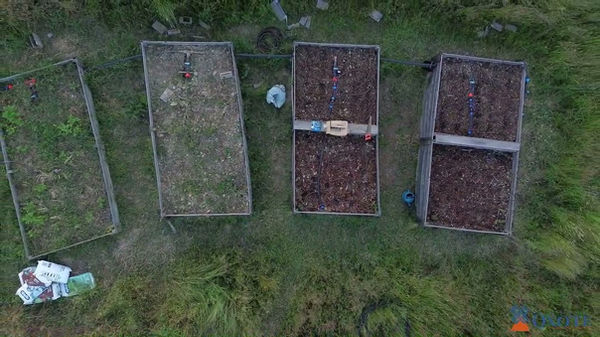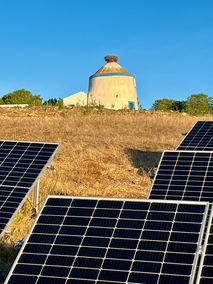top of page

Actions
Restoring the Land
Around 94% of Baixo Alentejo is susceptible to desertification (NOVA FCSH, 2023). This dire reality combines poor land management with the effects of climate change, causing serious damage to both biodiversity and the local economy. Since 2021, on our 9ha property at Monte dos Três Moinhos, we've chosen to treat the land differently. Here are some of our actions:

Regenerative Grazing
Instead of plowing the land twice a year with heavy machinery, we adopted sheep. Our neighbor, Sr. Luiz, periodically brings his flock of 200 sheep to graze throughout the property. With the help of these lovely assistants, we avoid soil compaction, add natural fertility with manure, and control the growth of grass which, in dry periods, represents a fire hazard.

Biofilter and Water Retention
A less glamorous part of the production and consumption cycle is waste decomposition, which consumes liters of water and overwhelms structures that must handle chemical and biological contaminants. By building our phyto-treatment plant (fito-ETAR), we spread knowledge about natural processes in wastewater treatment, offering an efficient and low-cost example, which is crucial in areas with low population density.

Permaculture Assessment
Working with nature to create resilient and sustainable systems requires understanding the specific characteristics of our local environment. Topography, water systems, soil quality, and local wildlife are key factors when seeking balance and lasting restoration. Learning to observe natural cycles in succession within our surroundings is the most challenging aspect of building a biodiversity glossary that we aim to continually strengthen and enrich.

Food Forest
We're creating a multi-layered ecosystem that mimics natural forests while producing food. Over 700 native and drought-resistant seedlings have been planted in an experimental plot to provide food and restore biodiversity. Our plan features fig, almond, and popler trees as the canopy, with smaller fruit bushes below. Nitrogen-fixing plants enrich the soil, while herbs and flowers attract beneficial insects.
This system maximizes vertical space and creates diverse microclimates. As it matures, it will need less maintenance and water than conventional agriculture—ideal for Alentejo's challenges. Deep root systems will prevent erosion and improve water infiltration, healing the land while providing food security.

Compost and Mulch
An essential part of building soil life is enabling natural decomposition processes to take place and integrate precious nutrition on the ground. By composting and vermicomposting organic matter, we accelerate this process, ensuring resources aren't wasted. By mulching the newly planted areas, we create a barrier against water evaporation and protect the soil from erosion.

Solar Energy
Our solar energy system reduces our ecological footprint while powering our restoration projects. Strategically placed photovoltaic panels capture maximum sunlight to power water pumps, monitoring equipment, and accommodations. Battery storage ensures operation during cloudy periods. This self-sufficient approach demonstrates how renewable energy can be integrated into regional agricultural and conservation practices.
bottom of page








